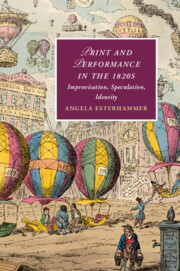Book contents
- Print and Performance in the 1820s
- Cambridge Studies in Romanticism
- Print and Performance in the 1820s
- Copyright page
- Contents
- Illustrations
- Acknowledgements
- Chapter 1 Introduction: Being There, circa 1824
- Chapter 2 Periodical Performances
- Chapter 3 Mediating Improvisation and Improvising Mediation
- Chapter 4 Personal Identity, Impersonation, and Charles Mathews
- Chapter 5 Theodore Hook’s Sayings and Doings on the Page and the Stage
- Chapter 6 Speculating on Property
- Chapter 7 Scottish Fictions of 1824
- Notes
- Bibliography
- Index
- Cambridge Studies in Romanticism
Chapter 6 - Speculating on Property
To and from the Village with Galt, Mitford, and Scott
Published online by Cambridge University Press: 11 March 2020
- Print and Performance in the 1820s
- Cambridge Studies in Romanticism
- Print and Performance in the 1820s
- Copyright page
- Contents
- Illustrations
- Acknowledgements
- Chapter 1 Introduction: Being There, circa 1824
- Chapter 2 Periodical Performances
- Chapter 3 Mediating Improvisation and Improvising Mediation
- Chapter 4 Personal Identity, Impersonation, and Charles Mathews
- Chapter 5 Theodore Hook’s Sayings and Doings on the Page and the Stage
- Chapter 6 Speculating on Property
- Chapter 7 Scottish Fictions of 1824
- Notes
- Bibliography
- Index
- Cambridge Studies in Romanticism
Summary
By examining a constellation of writings originating in the years 1822 to 1824, this chapter brings together various forms of mobility and speculation. Galt’s Sir Andrew Wylie, of that Ilk depicts an enterprising protagonist’s move from rural Scotland to London and back again, once he has undergone a performative process of identity construction in a series of socio–economic fields. Published first in periodicals and then collected into volumes entitled Our Village, Mitford’s prose sketches about life in rural Berkshire document changes caused by speculation on property and new modes of transportation that increase both voluntary and involuntary mobility. Saint Ronan’s Well, Scott’s only novel set in the nineteenth century, presents the related but contrasting scenario of a Scottish village disrupted by the speculative development of a fashionable spa; it interweaves themes of gambling and identity theft with a critique of contemporary print culture and reading habits. Recurring motifs in these works show how authors and characters respond to changes in socio-economic relations as increased mobility affects their capacity to control literary, personal, and real property.
Keywords
- Type
- Chapter
- Information
- Print and Performance in the 1820sImprovisation, Speculation, Identity, pp. 143 - 171Publisher: Cambridge University PressPrint publication year: 2020

